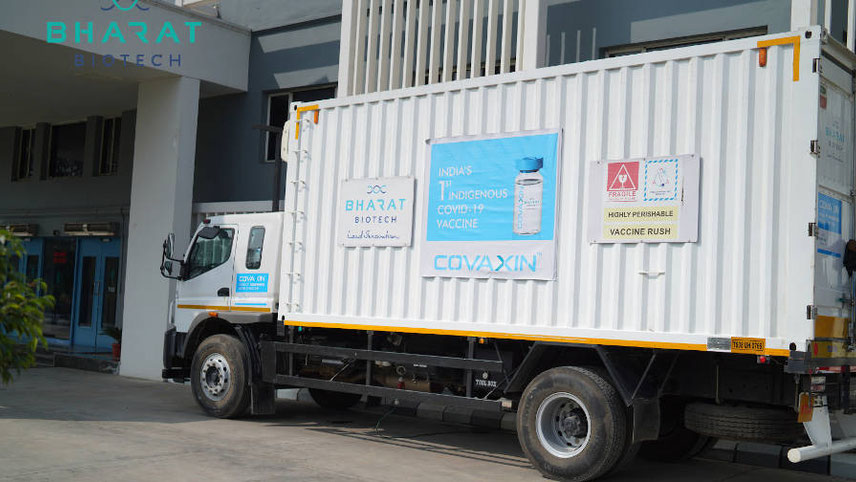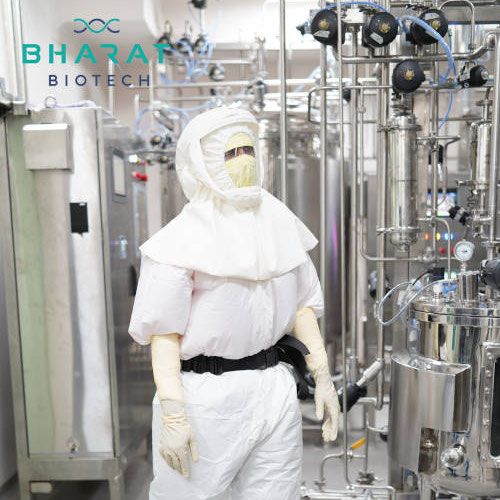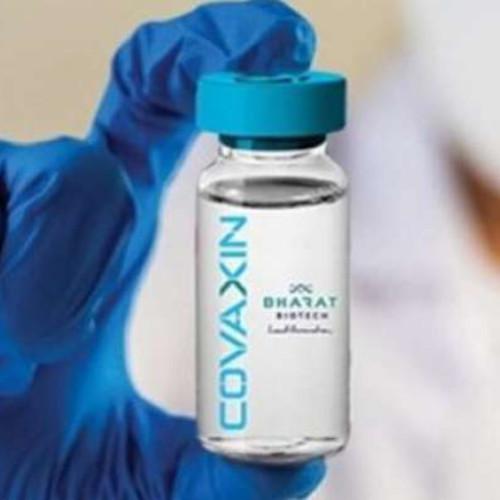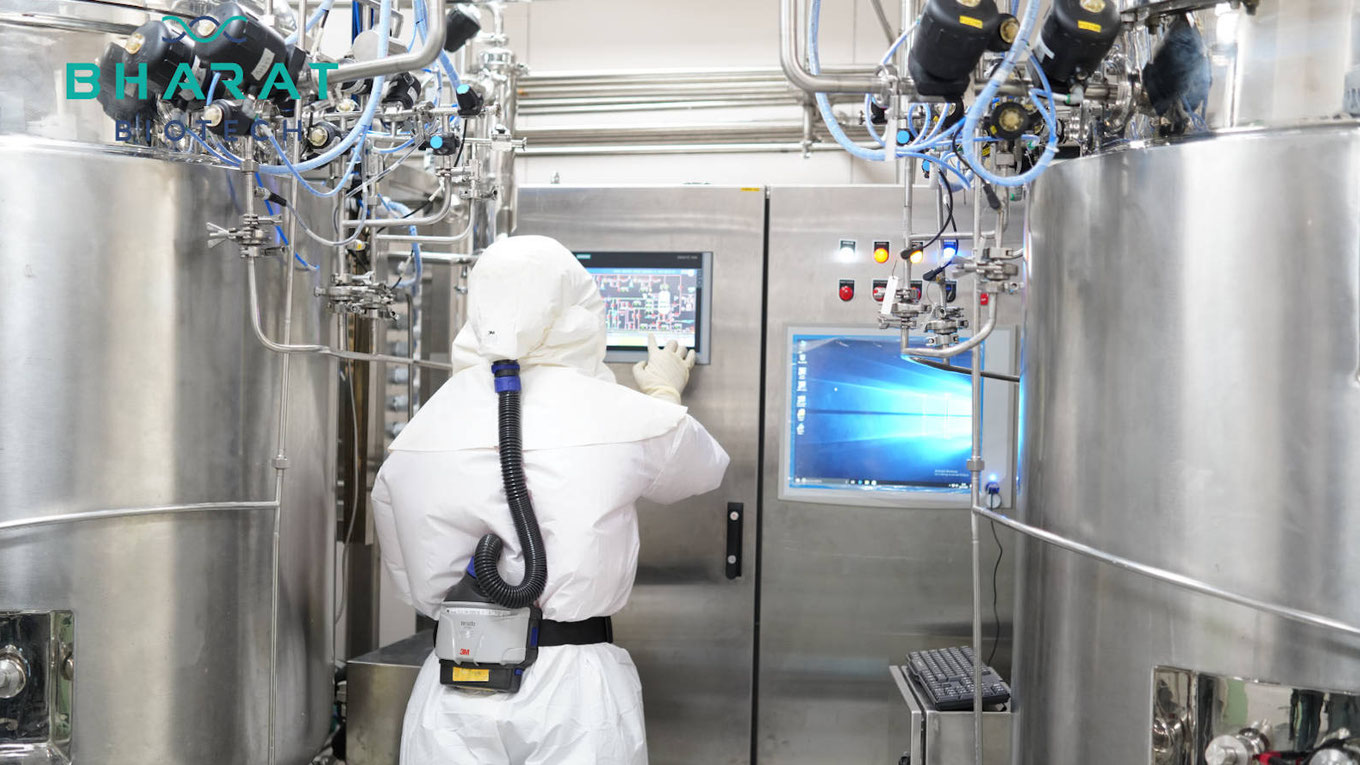-

Krishna Ella: We are a global company based in India
Phase III trials of any medicinal product (including vaccines) are the final phase of trials required before it can be released in the market. Phase III trials are usually carried out on a large number of prospective users (in this case, people at risk of contracting the Covid-19 infection). This comes only after the Phase I and Phase II trials have demonstrated the product to be both safe and effective for the medical condition concerned.
In the case of Covaxin, the Phase III trials were conducted on over 25,000 subjects in different hospitals and research centres across the country. The results published now are the first set of interim results while more data, analysis and conclusions are expected to be announced in the coming months.
Covaxin is by no means the only vaccine candidate to enter the market in recent weeks. There is Covishield, being manufactured in India by the Pune-based Serum Institute of India (SII), apart from those produced by Pfizer and Moderna (both US-based companies) as well as a couple of Chinese companies. Others in the running include Zycov D, a research product of Zydus Cadila, Ahmedabad, but they are all in various stages of clinical trials.
Of these, Covaxin and Covishield are the two which are available in India and a number of low and medium income countries (LMIC), while the US-based offerings are not. However, there is one fundamental difference between the two. Covishield is designed by modifying a chimpanzee adenovirus, so that it can carry the Corona Virus Spike Protein into human cells.
On the other hand, Covaxin is based on an inactivated whole virus, quite similar to the SARS virus seen in several south Asian countries almost a decade ago. Both have to be given in two doses via intramuscular injections about four weeks apart.
The research stages of Covishield were completed in the Oxford University and SII is manufacturing it under a licensing agreement, while AstraZeneca has been granted the rights for manufacturing and marketing in Europe and other western countries (see Cover Feature, Business India, July 27-August 9, 2020). Covaxin, on the other hand, was developed in the National Institute of Virology (NIV), a laboratory operating under the umbrella of Indian Council of Medical Research (ICMR). It is therefore completely funded by the Indian government. For mass scale production of Covaxin, the ICMR signed an agreement with Bharat Biotech, based in Hyderabad. Thus it is entirely an Indian accomplishment.
Adverse comments
Trouble began for Bharat Biotech when the Drug Controller General's (DCGI) office announced on 3 January this year that Covaxin had been granted Emergency Use Authorisation (EAU), also known as Restricted Emergency Use (REU), when its final phase of clinical trials had just started. Immediately, an outburst of adverse comment in social media as well as national news channels began, with the Central government’s unseemly haste in authorising the vaccine product.
The operative word here was ‘emergency’ but this fact was completely overlooked in most discussions in the public domain. Also, the intention of the Central government of making the vaccine available to frontline healthcare workers and others, who faced the risk of infection on a daily basis, was totally lost. Since a few reputed scientists also joined in, the anti-Covaxin side gained a lot of strength.
Counter-allegations that sought to discredit the criticism against Covaxin and those responsible for it were also made, but they were relatively muted. Perhaps, they were worried that they would be accused of currying favour with the government. However, some voices like those of Professor Jacob John, the former head of virology at ICMR began to speak up.
-

Suchitra: a remarkable journey
A couple of days later, Ella addressed a virtual media conference that lasted almost 90 minutes and sought to dispel some of the misconceptions swirling in the media. He took great pains to emphasise that the EAU or the REU was not a first time underhand move created by the Indian government to enable an Indian product to get ahead of the competition. It is a worldwide system adopted by the US FDA as well as health authorities in many developed countries.
Thus, he quoted the example of the Ebola virus outbreaks that began in Central Africa in 2014-16, for which an EAU was granted long before the proper clinical trials were conducted. In fact WHO records show that results of clinical trials on the Ebola Virus Vaccine were completed just last year – a full five years after the first outbreak was reported!
“People are considering us an Indian company but we are not,” explained the Bharat Biotech CMD. “We are a global company based in India, and we are touching as many as 123 countries. Therefore, at stake is the brand image of Bharat Biotech as a company and the brand image of India as a manufacturer of high quality medicines”. He also pointed out that his company was already involved with a lot of other vaccines before the Covid-19 came up.
Besides, the Hyderabad-based company has earlier conducted clinical trials on different biological products, not just in India but in as many as 12 countries, including highly regulated markets such as the UK. Another set of clinical trials are being conducted right in the UK and US on another of their product which protects people against para-typhoid. All these trials put together have been conducted on over one million children in various continents.
This is not the first time that Bharat Biotech has landed in hot water over its Covid-19 vaccine. Back in July 2020, soon after the ICMR and Bharat Biotech signed an agreement to manufacture the NIV vaccine, the ICMR announced that Bharat Biotech’s vaccine product would become available in the market by 15 August. This was absurd and impractical because human trials on the vaccine had not even started by then.
The entire media and much of the intelligentsia scoffed at the ICMR, which was soon discarded by the appointed date passed quietly without any further events. However, six months later, everyone remembered this incident and used it as a stick to bash the company and the government once again.
Though it has become a household name in India in recent weeks, Bharat Biotech has been engaged in research and production of vaccines and biological medicines from a very early stage. The founders, Krishna Ella and Suchitra Ella, both well-respected scientists in the US, returned to India and established their own company in 1996. They named it as Bharat Biotech because their stated mission was to make in India the vaccines and biological substances that could combat a number of tropical diseases.
As it is widely known in the medical and pharmaceutical world, multinational pharmaceutical companies based in the developed nations would allocate much of their R&D budgets for research into medical conditions affecting their own countries.
-

Taking up the cause to help the country and the world
The PATH they chose
One of their early products was a vaccine against Hepatitis B; by 1999, they were producing 100 million doses annually and, thus, became the largest manufacturers of Hep-B vaccine in the world. In 2002, a grant from the Bill & Melinda Gates Foundation enabled the company to develop new vaccines against Malaria and Rotavirus Disease. The grant was routed through the Programme for Appropriate Technology in Health (PATH).
Incidentally, Bharat Biotech’s relationship with PATH still endures until the current year. On 27 January this year, in the midst of all that Covaxin chaos, the company signed a three-way product transfer agreement on malaria vaccines, According to this arrangement, Bharat Biotech, PATH and GSK (formerly known as Glaxo Smithkline) will join hands to ensure a supply of millions of doses of a malaria vaccines in Ghana, Kenya and Malawi.
The list of Bharat Biotech’s achievements over the years is long and varied – a partnership with a Cambridge-based company for Japanese Encephalitis vaccine (2005), the launch of BioHib vaccine to protect vulnerable populations from Hemophilus Influenza (2007) and a cell-culture based vaccine against Swine Flu (2010). These are just a few examples; there are many more.
More recently, in 2016, when the Zika virus created a scare in many parts of the world because of its impact on expectant mothers, Bharat Biotech became the world’s first company to patent a vaccine against the disease. The reason that Zika Virus disease was feared to that extent was that babies born to Zika-afflicted mothers had abnormally small head (see Business India, February 1-14, 2016). This meant their brains would be grossly underdeveloped, resulting in severely reduced intelligence, cerebral palsy and other such serious medical conditions. Incidentally, the Zika Virus Vaccine was also given permission for administration to human subjects well before formal clinical trials could be completed.
The manufacturing of all these vaccines and biological substances that Bharat Biotech comes out with, takes place at its central production facility in Genome Valley, Hyderabad. This is the largest facility of its kind in the Asia-Pacific region and conforms to the highest global standards established by drug regulatory authorities of most of the developed countries.
“Our rigorous quality control processes ensure that we consistently deliver safe and effective products that are trusted by physicians worldwide,” informs the company website. “As a company that strives for overall manufacturing excellence, we use raw material and other natural resources optimally and seek to eliminate waste as much as possible. We also practise responsible waste management to reduce any impact on the environment. Our manufacturing records are comprehensive and readily accessible to regulators during inspections. We adopt a zero-tolerance approach to data integrity issues.”
“Besides quality, we seek to achieve industry-leading efficiency to deliver on our promise of affordable vaccines. With our patented technologies, we played a vital role in bringing down the cost of producing Hepatitis–B vaccines, thereby making it affordable for millions across the country and other developing nations,” the company website adds.
-
Our manufacturing records are comprehensive and readily accessible to regulators during inspections. We adopt a zero-tolerance approach to data integrity issues
In view of this long and illustrious record, a number of Covid-19 affected countries have requested Bharat Biotech (through the Indian government) to provide millions of doses of Covaxin. Many have approached India for large quantities of Covishield as well, because the Serum Institute has a similarly impressive record of global leadership in the field of vaccine manufacture (see Cover Feature, Business India, July 27-August 9, 2020).
With this thought in mind, the heads of missions from over 60 countries, spread over several continents visited the Bharat Biotech manufacturing facilities in December 2020. According to an All India Radio report dated 9 December, more than 60 foreign diplomats visited the Bharat Biotech production plants in Hyderabad. Most of the visiting dignitaries expressed satisfaction with the company’s manufacturing infrastructure and appreciated India’s emergence as a global leader in Corona Vaccine production.
The most recent visitor was a three-member delegation from the Ukraine government, headed by Maksym Stepanov, the country’s health minister. The delegation, that included Igor Ivashchenko, Deputy Minister of Health, Ukraine, and Ivan Konovalov, Head of Trade and Economic Dept, Embassy of Ukraine in India, had a discussion with Bharat Biotech’s leadership to secure the supplies of Covaxin to Ukraine.
“We look forward to benefiting from India’s vast capability in the manufacture of vaccines to effectively combat the Covid-19 pandemic at home,” Stepanov said. “We had a good interaction with the team at Bharat Biotech and it was a great experience to take a tour of the facility and inspect its impressive manufacturing capabilities. We will soon firm up the Covaxin delivery plan for the mass vaccination of our people.”
Bharat Biotech has also made public its agreement with Ocugen, a US-based biopharmaceutical company, to co-develop, supply and commercialise Covaxin in the US market. “Under the terms of the agreement, Ocugen will have US rights to the vaccine candidate and will be responsible for clinical development, regulatory approval (including EUA) and commercialisation for the US market,” says a joint news release from both companies issued on 2 February this year.
“Bharat Biotech will supply the initial doses to be used in the US upon Ocugen’s receipt of a EUA. In addition, Bharat Biotech will support the technology transfer for manufacturing in the US. In consideration for the exclusive licence to the US market, Ocugen will share the profits from the sale of Covaxin in the US market with Bharat Biotech, with Ocugen retaining 45 per cent of the profits.”
-

The company follows rigorous quality control processes
Collaboration with Ocugen
“The collaboration will leverage the vaccine expertise of Ocugen’s leadership team. In preparation for the development of Covaxin in the US, Ocugen’s Vaccine Scientific Advisory Board and Ocugen management have initiated discussions with the U.S. Food & Drug Administration (FDA) and the Biomedical Advanced Research and Development Authority (BARDA) to develop a regulatory path to EUA and, eventually, biologics licence application (BLA) approval in the US market for Covaxin. Ocugen is also in active discussions with manufacturers in the US to produce a significant number of doses of Covaxin for the US market,” the joint news release adds.
Given its achievements in production of vaccines and biotech-based medicines, many of which are state-of-the-art, it is rather amazing that Bharat Biotech has a modest revenue turnover of just over Rs1,000 crore. This is quite small in comparison with Indian pharmaceutical giants like Dr Reddy’s Laboratories (Rs17,460 crore) or Sun Pharmaceuticals (Rs33,470 crore). On reason for this could be Bharat Biotech’s dependence on sales to government health programmes, both in India and in the emerging economies. Sales to the public health sector account for almost 44 per cent of the company’s total revenues.
According to an ICRA report published in October 2020, Bharat Biotech’s annual sales have jumped from Rs798.8 crore (PAT: Rs98.7 crore) in 2018-19 to Rs1079.7 crore (PAT: Rs298 crore). Though it has captured the imagination of the world with Covaxin, the company made most of the money that drove its growth in the past year or two through the Rotavirus Vaccine and Typhoid conjugate vaccine. Rotavirus disease causes diarrhea in infants and young children, many of who are under five years of age, and is responsible for an estimated global death toll of 215,000 every year.
Typhoid vaccine is widely known as a preventive measure for enteric fever, but Bharat Biotech scientists have linked it to a variety of tetanus toxoid, to create a conjugate vaccine known as TCV. At the moment, Bharat Biotech is the world’s only producer of TCV to be pre-qualified with the World Health Organization (WHO). This means that Bharat Biotech’s product can be sold to various Low and Middle Income countries whose immunisation programmes are partially or completely funded by the WHO. Hence, export of TCV is likely to push up the company’s annual revenue and profits considerably in the next few years.
Likewise, in 2018-19 Bharat Biotech acquired a 100 per cent stake in Chiron Behring from GSK Asia, and thus obtained a WHO prequalification for Rabies Vaccine. The management put Chiron through a technology upgrade, after which this single product added Rs38,1 crore to the company’s topline.
-
Covishield is designed by modifying a chimpanzee adenovirus, so that it can carry the Corona Virus Spike Protein into human cells. On the other hand, Covaxin is based on an inactivated whole virus, quite similar to the SARS virus seen in several south Asian countries almost a decade ago
The ICRA evaluation is that the company has a strong liquidity position with cash and liquid investments of Rs372.1 crore and an unused working capital buffer of Rs150 crore. It has plans for capital expenditure of Rs200 crore in the next two financial years, which would be used for building new capacity for production of Covaxin. In addition, it proposes to invest an additional Rs100 crore for R&D in new products for the future.
Bharat Biotech’s positioning as a global leader has been rewarded from time to time by investment from both private equity players such as ICICI Ventures and funding agencies like International Finance Corporation (IFC), the soft financing arm of the World Bank. Way back in 2004, the IFC picked up a 24 per cent stake in the company with an investment of $6 million. Also, ICICI Ventures had acquired a 10 per cent stake in the company, which Bharat Biotech’s promoters bought back in November 2020 for a valuation of Rs135 crore.
What ICICI Ventures had originally paid is not quite clear at this point. Similarly, in 2016 at the height of the Zika virus outbreak affecting several countries and threatening to invade the US, the Carlyle Group, global private equity giant, tried to buy out all the other PE investors for an estimated valuation of Rs1,200-1,300 crore. But according to media reports, the deals did not materialise.
Now that the company is well advanced to its next big opportunity, namely, a new vaccine for Covid-19, which can be administered as nasal drops, we can expect another round of attempts by international investors to take over the company. Carlyle Group, for example, may try to revive its bid for control of the company as it had done five years ago.
-

Covaxin is the only vaccine developed totally indigenously
The next big thing in Covid-19
One of the toughest challenges in the Covid-19 vaccination programme all over the world is that of administering injections. Though it appears a simple ‘jab’, the slightest infection creeping into syringe or the needle may result in a painful abscess (pus formation) at the injection site, whether it is the arm or the backside. Besides, an improperly given injection in the buttocks can actually damage the nerve supply of one leg, with consequences hard to imagine.
Besides, a nasal vaccine would be absorbed into the blood stream in a much shorter time than one which is injected into a muscle in the upper arm. This is because the tissue inside the nose has much more blood supply that most parts of the body. Further, the Corona Virus first lodges itself in the mouth and nose (which is why testing for infection is done through nasal and oral swabs), and a vaccine given through the same organs would likely prove to be more effective.
A nasal vaccine would also obviate the need to train health workers for giving the injection. Instead, school teachers and post-office employees can also be assigned this kind of work. The experience of Pulse polio, where drops of polio vaccine were delivered into the babies’ mouths, could be repeated in yet another immunisation campaign.
This is why there is such interest at least in healthcare professionals over the prospect of the Covid vaccine being given in the form of nasal drops. Bharat Biotech has one such product on the cards – BB154, which is the scientific designation of the product. Even as the controversy over clinical trials of Covaxin was raging, the DCGI office issued its permission for their nasal vaccine to enter human trials. This means the product has completed its animal studies and can now be tested in human volunteers.
However, these clinical trials also have to be conducted in three phases just like every other vaccine of medicinal product. It is going to be a gradual process and the company has been extremely careful not to mention any timelines for the completion of the trials. However, the Phase I and II would possible be finished faster than usual because the safety and effectiveness in human subjects has already been demonstrated (through Covaxin). Progress of these trials, as in the Covaxin trials would however be quicker than most medicinal products because there is no shortage of human subjects to test on.







































